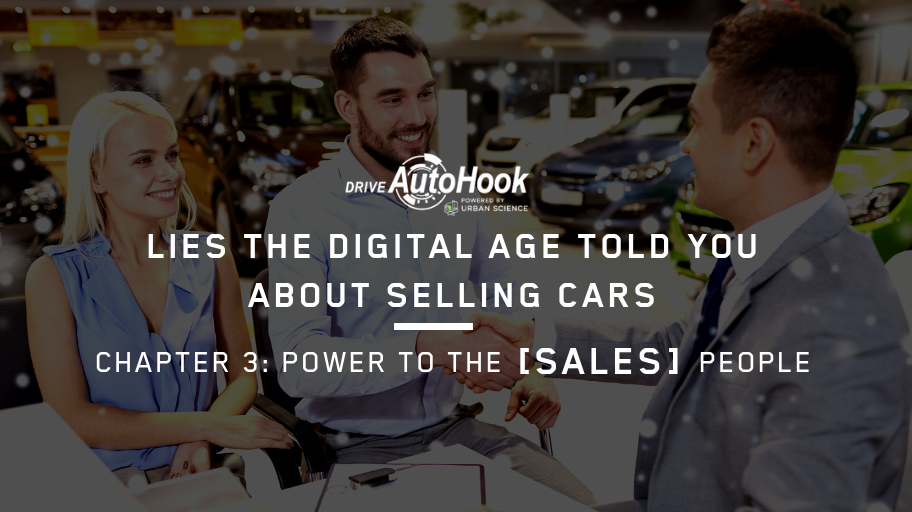| by David Metter, President of AutoHook powered by Urban Science
I’d like to begin with a subtle reminder of the harsh reality of how car shoppers in today’s technology-first world really feel about the car buying process. Below are a few highlights to help paint the picture…
52% of car shoppers feel anxious or uncomfortable at dealerships and millennials are leading the pack in their dislike, with 56% saying they’d rather clean their homes than negotiate with a car dealer. (The Harris Poll Insights & Analytics)
“Stressed,” “overwhelmed,” “taken advantage” and “panic” were among the top 10 words used by female car shoppers when reviewing their in-dealership experience. (CDK Global)
Studies suggest that some Americans would rather get a root canal than take their car to a dealership. (Automotive News)
I could go on for days with stats like this, but we have more important things to discuss - such as how to change the current perception. The upside to all the negativity around car buying is that we have A LOT of room for improvement. And dealers aren’t necessarily to blame either. The problem is, what we’re told about consumer behavior in the digital age compared to what car buyers themselves actually do in the digital age are often two very different things.
We live in a constantly connected, convenience-based universe inundated with unsanctioned opinion and as a result, we’ve become conditioned to rely on technology to solve problems. We know the in-store experience is important, but we’re too fast to look to the latest technology to solve the problem rather than focusing on what we can actually control. Not just something dealers have the power to influence, but also something that may ultimately yield the highest ROI out of any available technology in the market…which is your salespeople. How did I come to that conclusion? Funny you should ask.
In the article, “What’s the REAL Cost of a Bad Salesperson?” I dissected the monetary difference between what good salespeople can contribute to your dealership over time versus what just one bad salesperson could cost you. A salesperson selling 15 cars a month yields about $270,000 a year in gross profit. Then when you factor in the lifecycle of the vehicle and any potential service revenue associated, you’re looking at a minimum value of $325,000 a year in pure gross profit for any one good salesperson. Read the blog if you don’t believe the numbers.
Now consider the reverse. One salesperson that loses 15 sales a month to one of your competitors is costing your dealership $325,000 a year in gross profit. Multiply that by just four people and you’re looking at $1.3 million in lost gross profit a year. But here’s the kicker. Without the right data processed through the right technology, you would have no way of knowing how many customers your salespeople interacted with that left and bought a car from someone else. Perhaps due to a negative experience?
A recent study from Cox Automotive suggests that initial experience may be more important today than ever before. The rate of car buyers returning to dealerships where they have previously purchased or leased from is increasing. 40% of new vehicle buyers in 2018 are repeat dealer customers compared to 31% in 2016. This is great news, but it puts even more pressure on getting it right for that first-time buying experience and, in most cases, your sales team is directly responsible for it. Customer loyalty and the chance of them coming back to buy a second or third car depends on the experience your dealership provides them with upon arrival. So your people better be armed and ready.
Jeremy Beaver, COO of Del Grande Dealer Group, told Automotive News, “Retention is the Holy Grail, and the experience is what drives retention. You have to shift away from a ‘visit’ mentality and think about a ‘lifetime value’ mentality.” I could not possibly have said it better myself. This is an example of a dealer that just GETS IT – both on the sales side and on the service side. Their Fixed Operations Director, Trully Williams said, “The technology enhances the experience, but you start with the fundamentals of people and process. You get those right and then add the technology.”
There is a seriously infinite amount of opportunity for improving your dealership’s operational process, and it starts with your people. Dealers don’t have time to guess who their good and bad salespeople are – that’s where the technology comes in. You can’t retain good salespeople if you don’t have the technology to know who they are. The right technology can tell you who is letting the most opportunities walk out the door. It can tell you which leads your people are struggling with and the exact time frame during the month they struggle with the most. There’s a lot technology can do to help your people and to enhance the car buying experience, but it can’t drive the car buying experience entirely. At least not before flying cars become a thing.
So before your brain explodes from all the numbers and reporting being thrown at you during any given moment, or from all the external pressure you’re getting to improve 50 different KPIs at the same time, remember that your people are what gives meaning to the metrics. Retention, should be your absolute number one focus and priority in the digital age – and that applies to both your salespeople AND your customers. Running a successful dealership ultimately translates to retaining good salespeople, but you need the help of good technology to be able to do that. Ironic, I know.
Stay tuned for the upcoming fourth and final chapter of Lies the Digital Age Told You About Selling Cars: The Executive Edition. Dealer Managers will learn real-life examples of how to apply new technologies to directly support the success of your salespeople instead of relying on technology to do the selling for them. The more you can do to help your employees be successful at your dealership, the more likely you are to retain them, which ultimately leads to everyone’s mutual benefit – not to mention the benefit of your bottom line.











